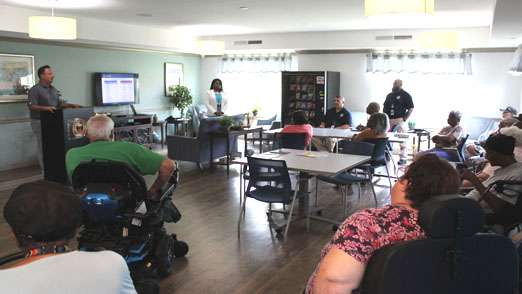By Frank Sinatra, AAP Editor
Ever conscious of the property tax levy cap law that has been mandated by the State of New Jersey, Pennsauken Township’s administration and the Township Committee have worked diligently to keep 2016’s local property tax levy at the same level as last year.
Pennsauken’s 2016 budget, which has recently been approved by the State of New Jersey, allows each taxpayer in Pennsauken to pay .173 cents per $100 of their property’s assessed value for the garbage district budget and .976 cents per $100 of their property’s assessed value for the municipal budget. The combination of the two rates, $1.149 per $100 of the assessed value, is the same as 2015; there will be no increase in the local portion of Pennsauken residents’ 2016 property tax bill.
“Our Township Committee, working hand-in-hand with our administration, has done a great job with this year’s budget” says Pennsauken Mayor John Kneib. “Keeping the local property tax levy level is the best way to both be fair to Pennsauken residents, while also maintaining the level of services the Township provides our community.”
Several factors helped the Township maintain the level of local taxes. For the third straight year, Pennsauken had a tax collection rate in excess of 97 percent.
“This is absolutely critical to keep everyone’s taxes within reason,” explains Kneib. “Once again, credit has to be given to people like Ron Crane, Karen Dunn, Pat Huerta, John Dymond, and Danny O’Brien.
 “In addition, the Township’s economic development department has again secured additional businesses to move their headquarters into Pennsauken. New businesses coming into town help to increase tax ratables, which offset increasing municipal costs. I give credit to both Terry Carr and Larry Cardwell. Thanks to their tireless efforts, companies like Princeton Tec, Restaurant Depot, and now Bayada Home Health Care, are moving and expanding into Pennsauken; and our residents are directly benefitting from it.”
“In addition, the Township’s economic development department has again secured additional businesses to move their headquarters into Pennsauken. New businesses coming into town help to increase tax ratables, which offset increasing municipal costs. I give credit to both Terry Carr and Larry Cardwell. Thanks to their tireless efforts, companies like Princeton Tec, Restaurant Depot, and now Bayada Home Health Care, are moving and expanding into Pennsauken; and our residents are directly benefitting from it.”
In addition, the Pennsauken Country Club generated $180,000 above the amount needed to cover operation costs and course maintenance. This entire amount goes directly towards property tax relief.
“Not only is the Pennsauken Country Club one of the finest municipal-run golf courses in South Jersey, it’s been a great help to our residents come budget-time,” adds Kneib.
The property tax levy is a portion of the yearly tax bill, which also includes the school, garbage, county and library taxes. It is used to fund Pennsauken’s municipal budget, which consists of operational costs, capital spending, debt service payments, salaries, pensions, and insurance expenses. The garbage district budget pays for the disposal of trash and recyclables, as well as waste management for Pennsauken residences.
The services that Pennsauken Township provides its residents and businesses would not be possible without local property taxes. These taxes make up the largest revenue source in the municipal budget.
During the past several years, Pennsauken Township has tirelessly worked to keep costs down in order to better manage these types of financial challenges. And by maintaining a conservative approach to Township operations, Pennsauken is also better prepared to handle capital improvements that need to be addressed on a yearly basis. For example, in 2016, the Township will begin a multi-phase project to re-engineer the Township’s Department of Public Works facility, with the construction of a 30’ x 150’ garage building, as well as other important site improvements. Pennsauken will also address improvements and repairs to its infrastructure, as there are 102 miles of road that the Township is responsible for maintaining, while replacing damaged curbing and improving storm drainage. Pennsauken’s 30 parks and playgrounds are also upgraded on a continual basis. The Township will also purchase a new seven-yard dump truck with a snow equipment package; a new John Deere backhoe with jackhammer attachment; and new equipment for first responders, including new police cruisers and several fire command and utility vehicles.
“Creating a municipal budget that maintains all of the services that residents come to expect, while being completely fair to taxpayers can be challenging. But as your representatives in local government, we’re up to that challenge,” says Kneib. “Our administrative staff, bar none, is probably the finest in all of the municipalities here. We all work tirelessly, each and every year, to create a fair and balanced budget. And I know we’ve done that again this year.”


